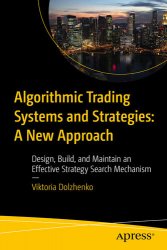Algorithmic Trading Systems and Strategies: A New Approach: Design, Build, and Maintain
- Добавил: literator
- Дата: 6-07-2024, 08:09
- Комментариев: 0
 Название: Algorithmic Trading Systems and Strategies: A New Approach: Design, Build, and Maintain an Effective Strategy Search Mechanism
Название: Algorithmic Trading Systems and Strategies: A New Approach: Design, Build, and Maintain an Effective Strategy Search MechanismАвтор: Viktoria Dolzhenko
Издательство: Apress
Год: 2024
Страниц: 452
Язык: английский
Формат: pdf (true), epub (true)
Размер: 12.1 MB
Design and develop a complex trading system from idea to operation. Old approaches were based on manually searching for strategy ideas. This book shows you how to create a system that will generate, optimize, and launch profitable strategies into a fully automatic mode.
Imagine a system that only requires access to the Internet and electricity from a trader. This book describes the architecture and features of such a system and provides recommendations for further development. Most books cover only the implementation stage and overlook the design and maintenance of these systems. Here, you’ll walk through the entire process of creating a complex, scalable and easily supported system.
For example, you’ll design an application based on microservice architecture and learn about development environments. You’ll also examine the advantages of horizontal scaling in the context of creating trading systems. Along the way, you’ll set up Kubernetes, connect the monitoring system, and understand the intricacies of continuous integration and continuous delivery.
Testing and identifying only dozens of strategies is a thing of the past. Algorithmic Trading Systems and Strategies: A New Approach shows you how to analyze thousands in the same amount of time.
The global trend to automate and algorithmize everything has now come to trading, and every year the number of algorithmic systems that help traders or that even trade independently is growing. Anyone can buy an algorithmic robot; you don’t need to be a programmer. There are so many of trading robots that the question becomes, why haven’t the people who created them used them to make themselves millions? Some may have, of course, but ironically it’s not so much thanks to trading, but rather thanks to the proceeds from selling the robots to consumers. My point is that you need to understand that no one would be selling a trading robot if trading with it could bring in more money than the sales from the robot itself. This does not mean that there are no helpful robots, just that robots can only do so much with search and analytics. There are different types of algorithms used in robots. The types differ not only in the logic of decision-making but also in money management, average trading time, trading method, price, and many other parameters. In addition, any trading robot must contain the analytical data of its work, which is valuable information for the buyer.
Of course, you can create your own trading system using your own ideas. But what do you do if you have no programming skills? In this case, special services can come to the rescue, where it is possible, without any special knowledge, to assemble your robot step-by-step. You can simply implement the decision-making logic and then test and analyze the resulting strategy. Some services even allow you to set up the money management rules and risk control, and others allow you to complicate the logic using a special scripting language. Unfortunately, it’s difficult to create something specific with these types of services. For more advanced strategies, you need to learn at least an easy scripting language to go beyond simple logic. Some services provide programming capabilities using languages such as Python or C#, both of which allow you to create more complex algorithms. In addition, there are many more such services other than “constructor” services. They usually have a large number of users and thus a developed learning environment.
One of the key modules of our system is the optimization algorithm module, which searches for and optimizes strategies in the strategy search subsystem. Our task of finding a profitable strategy has several features such as nonlinearity, multiextremality, complete absence of analytical expression, high dimension of the search space, and high computational complexity of the optimized function. All of these features explain why there is no universal algorithm for solving the optimization problem and finding a profitable strategy. This means that the optimization module must implement a number of different optimization algorithms. To solve the global optimization problem, several classes of optimization algorithms have been developed, one of which is the population algorithms class. In population algorithms, simultaneous work is carried out on several options when solving an optimization problem, in contrast to classical algorithms, in which only one candidate evolves. Genetic algorithms are a popular type of algorithm belonging to the population class. These are the ones I will use in the search for the optimal strategy. Genetic algorithms became known to the world after the publication of the book Adaptation in Natural and Artificial Systems. This class of algorithms was based on the ideas of Darwin’s theory of natural selection.
Contents:
Скачать Algorithmic Trading Systems and Strategies: A New Approach: Design, Build, and Maintain
Внимание
Уважаемый посетитель, Вы зашли на сайт как незарегистрированный пользователь.
Мы рекомендуем Вам зарегистрироваться либо войти на сайт под своим именем.
Уважаемый посетитель, Вы зашли на сайт как незарегистрированный пользователь.
Мы рекомендуем Вам зарегистрироваться либо войти на сайт под своим именем.
Информация
Посетители, находящиеся в группе Гости, не могут оставлять комментарии к данной публикации.
Посетители, находящиеся в группе Гости, не могут оставлять комментарии к данной публикации.

